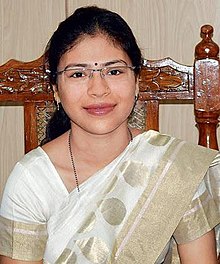‘Women of Influence’ by civil servant and author Rajni Sekhri Sibal is a celebration of stories of ten courageous women IAS officers who have walked the extra mile to overcome challenges posed by difficult circumstances.

With thirty-seven years of civil service, Rajni Sekhri Sibal has seen and experienced the challenges faced as woman IAS officers. Her latest book ‘Women of Influence’ highlights the episodes where the ten women officers displays immense courage and commitment during the most difficult of times.

Rajni Sekhri Sibal
Its protagonists span many generations with the oldest narrative being set at the Bikaner border in the 1965 Indo-Pak war and the latest 50 years after in Uttar Pradesh in 2015. An interesting recounting of incidents from times when seeing a female collector sahib was a rarity to those when we have women taking on tough postings in extremist affected districts, the book debunks the myth that certain postings are strictly ‘male terrain’. The author however takes great effort to point out that the book is not about gender issues, one-upmanship or putting women bureaucrats on a pedestal. “It is not my intention to portray that the protagonists in the book are perfect. No one is. Nor do I proclaim that they have no flaws. Every human being has something good in them along with some imperfections. I am merely presenting these positive episodes in the careers of these ten women, which are worth recounting” she says. Although the central characters in the book belong to different age groups, batches and cadres they are bound by a common thread of ethical standards, courage and commitment. The book derives strength from the manner in which we are made to understand the tremendous effort behind the success of seemingly simple government initiatives like pulse polio, right to education and human trafficking among others.
 Particularly inspiring is the story of the young IAS officer Durga Shakti who become a national sensation when she fearlessly reined in the illegal sand mining mafia unmindful of the difficulties that came her way. The incidents from ten vastly different situations and women who found both work-life balance with a fictionalized narrative add an element of drama and make the book both interesting and inspiring.
Particularly inspiring is the story of the young IAS officer Durga Shakti who become a national sensation when she fearlessly reined in the illegal sand mining mafia unmindful of the difficulties that came her way. The incidents from ten vastly different situations and women who found both work-life balance with a fictionalized narrative add an element of drama and make the book both interesting and inspiring.
The work of the ten women in brief.
- Otima Bordia’s story under the title ‘Winds of Change’ chronicles the story of the first Indian woman to be appointed as collector in a remote district in the Thar Desert along the Indo-Pak border in Rajasthan. This was just before the 1965 war broke out. It recounts how groups of women whose faces were covered with long ghoonghats(veils) came in groups to have a look at the collector sahiba. From scarcely believing that a woman could be the collector to commending her efforts when the desert skies were overcast with the clouds of war, hers is a story of grit and courage in a purely patriarchal society.
- Saving Lives is the saga of India’s victory over the deadly disease polio that plagued the country for decades and the incredible lady behind its success. Anuradha Gupta who joined the Health Ministry, looked at the pulse programme from a totally different perspective through out of the box thinking and strategy that took the country over the finishing line in the eradication of polio. It is through her efforts that India reported its last case of wild polio in January 2011, and continues to be polio free.
- Anita Kaul’s unshakeable faith in the power of ordinary people to bring about change that transforms lives outlined in the chapter on her titled ‘Power of the People’ and her role in the Right to Education Act is an ode to her belief in the power of education and effort to make it available to all children. Throwing hierarchy to the winds and putting her trust in collaborations, Anita made a significant contribution in providing education to the poor believing that it is a tool to remove ignorance, prejudices, discrimination, hatred and mindless violence.
- ‘Death in Police Custody’ is the story of a young officer Nikita who managed to avert a situation that could blow up into a major law and order issue through her sensitivity and insight. Handling the issue of a union leader who died in police custody because of a prior health problem deftly she diffused a major agitation by workers.
- Malini. V. Shankar’s posting in a Naxal prone area called Chadrapur close to Adilabad in Telangana and the challenges that she faced are highlighted in the chapter “Development amid Red Violence” and is set in the 1980’s when extremist activities were at their peak. Although there was a threat to those in the administration Malini braved it all and built a close rapport with the people in order to develop the region.
- Durga Shakti’s story and her efforts to curb the sand mafia is one of the most interesting narratives in the book covered in the chapter titled ‘Sand in the Eye’. A young and bold officer who stopped the illegal mining of sand a few kilometres from Delhi, the national capital, she ruffled many feathers in her endeavour but remained committed. Durga became well-known in the country after the state government suspended her owing to pressure from the sand mining lobby. The orders were revoked under pressure from the people and the media who stood by her.
- ‘Computers and Viruses’ gives us an insight into the management skills of the protagonist Anita who faced resistance in the process of introducing technology in a public enterprise. It was through her determination and commitment as Managing Director of the Central Cottage Industries Corporation of India (CCIC) that she overcame the resistance and strike launched by the Employees union and successfully introduced computerization through a smooth process of transition.
- Anjali Chugh’s story set in a border district of Punjab in the tumultuous eighties forms the narrative of the chapter titled ‘Kanooni Bibi and Panchayat Elections’. Kanooni as an epithet can mean overscrupulous but the title Kanooni Bibi was conferred upon her because of her uprightness which endeared the Returning officer to the electorate in the Panchayat elections.
- ‘Flowering Success in the land of the Rising sun’ is a beautiful description of Shakuntala Doley Gamlin, who became the first girl from the Mishing tribe to become an IAS Officer and the Chief Secretary of Arunachal Pradesh and the way she manifested her dreams. The complexity of administration in a state with 26 different tribes and 100 sub- tribes, and the skillful and imaginative approach with which she took her stakeholders along are awe inspiring
- Bhamathi worked for the rehabilitation of trafficked victims wherever she was posted and went through the entire gamut of advocacy, research, project formulation and implementation. “Of Sensitive Sensibilities’ chronicles her battle against human trafficking in all its forms in the entire duration of her career.












